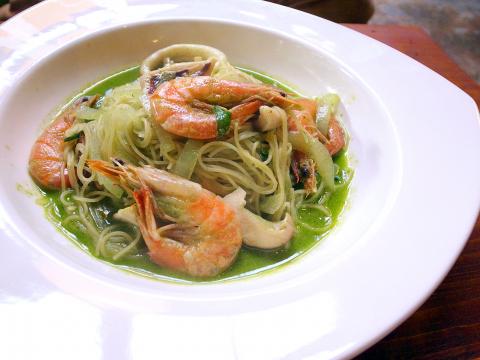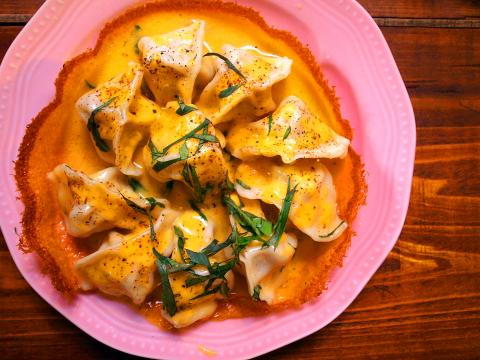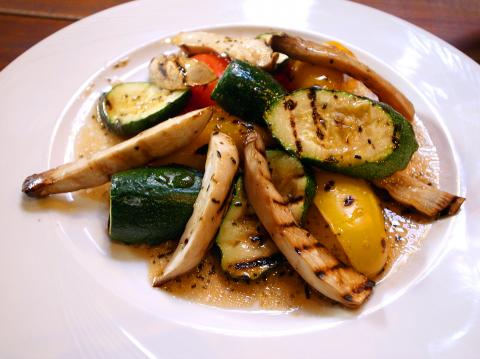For those who enjoy celebrity restaurants like Jay Chou’s (周杰倫) fantastical Deja Vu, Chang Hui-mei’s (A-mei, 張惠妹) place may look a bit plain.
At the A8 Cafe & Gallery, the menu is rustic, with much of it hailing from her hometown Puyuma village of Tamalakaw in Taitung County.
Stylistically, the restaurant is a hipster’s dream. An eclectic design ethos expressed in black iron, exposed cement, red brick and solid wood create a chic vibe. Usually, a restaurant where great care is taken over style can appear neurotically absorbed in its own trendiness. But with A8, high-end elements are balanced by little knickknacks and vintage furniture, which are said to come from the owner’s personal collection. The skull rings on the table and the wall painting of horse anatomy may not be to everyone’s taste, but the space is welcoming, as if it belongs to a really cool person who invited you in to relax, have a good time with friends or be restfully alone.

Photo: Ho Yi, Taipei Times
Children will definitely adore the menu’s golden fried dumplings (黃金煎餃, NT$200 for 10 and NT$250 for 15), which have a sweet corn and pork stuffing and are sprinkled with cheddar cheese and served on a crispy sheet made with more cheese. A local spin on French fries, the fried taro (炸芋條, NT$100) has an al-dente texture and uses the root vegetable grown in the Puyuma diva’s hometown.
The cafe offers a selection of pasta dishes, but the A8 spaghetti with garlic and chili (A8雀兒蒜味辣椒義大利麵, NT$250) my dining companions and I ordered last month was rather generic.
On the other hand, we loved our rainbow mix veggies (彩虹蔬菜, NT$250), which is a bowl of red and yellow bell peppers, zucchini and king oyster mushrooms brought to life by excitingly tangy mustard seeds.

Photo: Ho Yi, Taipei Times
My favorite part of the menu, however, was the home-style Tamalakaw dishes. Light-flavored and cooked with simple ingredients, the Puyuma loofah noodle soup (普悠瑪瓜瓜麵, NT$200) immediately brings a soothing sensation not unlike the warm, nourishing food your mother made for you when you were sick and needed to be pampered as a child.
The wait staff, many of whom hail from the Puyuma tribe, seem amicable and at ease and help to create a homey feel to the dining establishment. Below the restaurant, an art gallery holds exhibitions from time to time. Currently on display are oil paintings created by artists with disabilities
A8 also boasts a popular selection of desserts, including red-wine rose ice cream (紅酒玫瑰冰淇淋, NT$180) and waffles with apple, orange or mulberry jelly (A8自製果醬鬆餅, NT$220) that’s made in-house.

Photo: Ho Yi, Taipei Times
There are few choices of beer (NT$180 and NT$200) from the Netherlands and Germany, as well as a small collection of cocktails (NT$200 and NT$250) and wine (NT$1,250 and NT$1,500 per bottle, NT$250 and NT$280 per glass). A8’s signature drink is coffee made from beans grown and harvested in Tamalakaw. Its name, Haliwanes (哈莉瓦嫩思, NT$220), means rainbow in the Puyuma language.

Towering high above Taiwan’s capital city at 508 meters, Taipei 101 dominates the skyline. The earthquake-proof skyscraper of steel and glass has captured the imagination of professional rock climber Alex Honnold for more than a decade. Tomorrow morning, he will climb it in his signature free solo style — without ropes or protective equipment. And Netflix will broadcast it — live. The event’s announcement has drawn both excitement and trepidation, as well as some concerns over the ethical implications of attempting such a high-risk endeavor on live broadcast. Many have questioned Honnold’s desire to continues his free-solo climbs now that he’s a

As Taiwan’s second most populous city, Taichung looms large in the electoral map. Taiwanese political commentators describe it — along with neighboring Changhua County — as Taiwan’s “swing states” (搖擺州), which is a curious direct borrowing from American election terminology. In the early post-Martial Law era, Taichung was referred to as a “desert of democracy” because while the Democratic Progressive Party (DPP) was winning elections in the north and south, Taichung remained staunchly loyal to the Chinese Nationalist Party (KMT). That changed over time, but in both Changhua and Taichung, the DPP still suffers from a “one-term curse,” with the

Lines between cop and criminal get murky in Joe Carnahan’s The Rip, a crime thriller set across one foggy Miami night, starring Matt Damon and Ben Affleck. Damon and Affleck, of course, are so closely associated with Boston — most recently they produced the 2024 heist movie The Instigators there — that a detour to South Florida puts them, a little awkwardly, in an entirely different movie landscape. This is Miami Vice territory or Elmore Leonard Land, not Southie or The Town. In The Rip, they play Miami narcotics officers who come upon a cartel stash house that Lt. Dane Dumars (Damon)

Today Taiwanese accept as legitimate government control of many aspects of land use. That legitimacy hides in plain sight the way the system of authoritarian land grabs that favored big firms in the developmentalist era has given way to a government land grab system that favors big developers in the modern democratic era. Articles 142 and 143 of the Republic of China (ROC) Constitution form the basis of that control. They incorporate the thinking of Sun Yat-sen (孫逸仙) in considering the problems of land in China. Article 143 states: “All land within the territory of the Republic of China shall